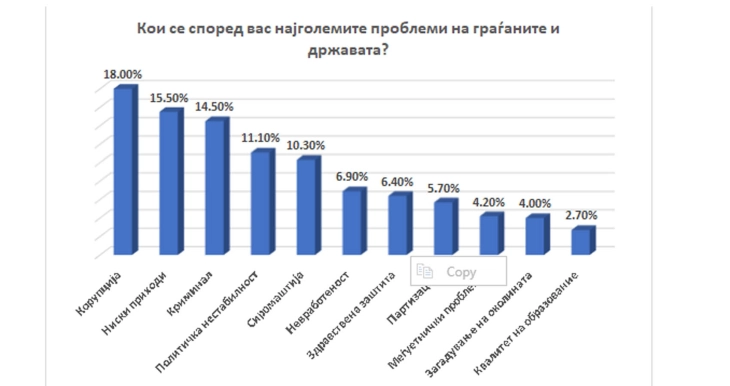Survey: Citizens' three most pressing problems are corruption, low pay, crime
- Corruption, low paychecks and crime are the three most pressing problems of North Macedonia's citizens, according to a public opinion survey conducted by M-Prospect research agency and commissioned by Solucija NGO.

Skopje, 8 February 2024 (MIA) — Corruption, low paychecks and crime are the three most pressing problems of North Macedonia's citizens, according to a public opinion survey conducted by M-Prospect research agency and commissioned by Solucija NGO.
Presenting the survey results on Thursday, Solucija co-founder and journalist Katerina Sinadinovska said more than two-thirds of respondents believed the country was moving in the wrong direction. Health care, the rule of law and economic growth were seen as the country's most important challenges, she said.
The survey was conducted from Jan. 9 to 21, 2024, on a sample of 1,000 citizens with a margin of error of 3.1 percent.
Asked about their biggest problem, 18 percent of respondents said it was corruption, 15.5 percent said it was their low income, and 14.5 percent said it was crime. Next down the list were political instability (for 11.1 percent of respondents), poverty (10.3 percent), unemployment (6.9 percent), health care (6.4 percent) and partisanship (5.7 percent).
Sinadinovska said responses did not differ much across ethnic communities, and interethnic relations were seen as a problem for only 4.2 percent of respondents. Another 4 percent of respondents said environmental pollution was their biggest problem, and 2.7 percent said it was education.

Asked about the direction the state was moving in, 68.3 percent of respondents said it was moving in the wrong direction, citing as reasons the dysfunctional system, the bad economic situation and corruption. Eleven percent of respondents said the state was moving in the right direction.
Regarding reelecting the current government, 73.1 percent of respondents were against the idea and 22.3 percent approved of it. At the same time, 60 percent of respondents said the opposition, if it came to power, would not solve their problems, either – whereas 33.4 percent thought it would.
"The citizens want the government down but they don't believe the opposition is any better," Sinadinovska said.
Regarding the most important challenges for the state on a scale from 1 to 10, with 10 being the most important, the top response was the health care system with an average score of 8.06, followed by the rule of law, corruption and impunity with a score of 8; and economic growth with a score of 7.96. Next were social justice and equality, the education system, and infrastructure development.
Over 80 percent of respondents were pessimistic about the future. Asked if they expected a better future for their children if they stayed in the country, 57.6 percent said that their life would be worse in the future, and 22.9 percent expected it to remain the same.
Only 16.9 percent of respondents expressed optimism on this issue. Ethnic Albanians, compared to Macedonians, were much more optimistic. One third of them expected a better future for their children, compared to 11.1 percent of Macedonians. 38.3 percent of Albanians and almost two-thirds of Macedonians, i.e. 64.2 percent, thought the future will be worse, and 22 percent of Macedonians and 25.4 percent of Albanians expected a status quo.

According to Societas Civilis Institute for Democracy president Marko Troshanovski and Macedonian Center for International Cooperation director Aleksandar Krzhalovski, the findings were not at all surprising and had only confirmed a general state of pessimism, defeatism, and insecurity among the public.
"This perception of the general situation in the country and the future that awaits is the result of a combination of two factors: the objective failure of the government to address and solve the citizens' most pressing problems, and, adding fuel to the fire, the hybrid attacks against Macedonian citizens targeted through social media by entities that want to harm the state. This increases even more their feeling of hopelessness," Troshanovski said.
Krzhalovski noted that it was interesting the citizens were recognizing high-level corruption in the form of public procurement tenders but were oblivious to widespread everyday corruption, "or the small amounts we are used to giving to get some service in the public sector," he said.
He added that it was also interesting that the majority of respondents would not trust the current ruling party again in the upcoming elections but they also did not believe that the opposition, if it came to power, would solve their biggest problems.

Regarding the upcoming elections, the two pundits said the parties should offer feasible ideas in their election platforms.
Troshanovski said that parties were likely to play the nationalism card that easily mobilized voters and that they would also promise to address citizens' concerns and needs. But, he said, voters needed to think much more critically about the parties' election platforms "because they are largely fairy-tale wish lists, given their low level of realization." He listed as an example the promise of free public transport in Skopje.
Krzhalovski agreed that the parties' promises needed to be weighed against the actual results. He also noted political parties were "not democratic" and expressed his concern about recent developments in the Alliance for Albanians "which show there is no essential culture of democracy in dealing with problems."
Speaking about EU integration potentially dominating the election campaigns, Krzhalovski said the narrative was a way for the government coalition to make up for the drop in ratings "by creating a polarization that isn't really there." He added that the campaigns would show "there is no real option other than the EU."
According to Troshanovski, thе "We Are for Europe" narrative will not garner as many votes as before. "People have experienced the hypocrisy of the EU integration process itself so this EU mantra will not mobilize votes like it used to," he said. mr/







